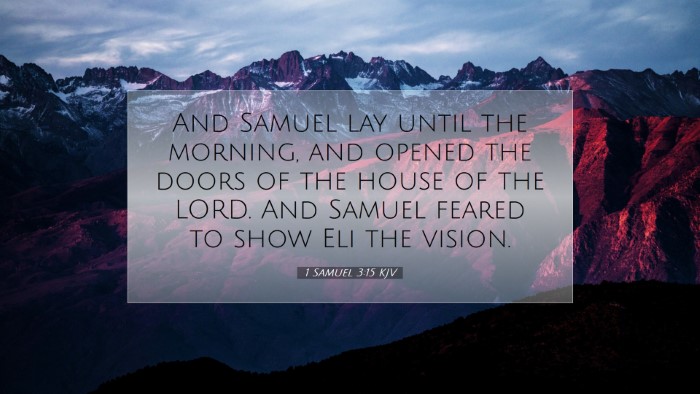Commentary on 1 Samuel 3:15
Verse Context: 1 Samuel 3:15 states, "And Samuel lay until the morning, and opened the doors of the house of the LORD. And Samuel feared to show Eli the vision." This verse captures a pivotal moment in young Samuel's prophetic calling and his initial experience with divine revelation.
Key Elements of the Passage
- Samuel's Position: Samuel was a young boy serving in the temple under Eli's mentorship. His innocence and purity are crucial for understanding the significance of the message he received from God.
- The Divine Revelation: Samuel’s experience signifies the direct and personal nature of God’s communication with His chosen servants.
- Eli's Role: Eli represents the old order of priesthood, which was becoming ineffective, highlighting a transition in Israel's spiritual leadership.
- The Concept of Fear: Samuel's fear to disclose the vision to Eli speaks to the gravity of the message and the young prophet's trepidation in confronting authority with God's judgment.
Insights from Matthew Henry
Matthew Henry notes that Samuel's hesitation to reveal the message to Eli reflects a natural fear that arises when delivering a potentially painful truth. Henry emphasizes the fidelity required of prophets when faced with the task of delivering God's judgment, which is never an easy burden. The fear exhibited by Samuel is indicative of the seriousness of his calling and the weight of divine revelation.
Insights from Albert Barnes
Albert Barnes points out that Samuel’s actions of lying down until morning demonstrate obedience and reverence for the house of the Lord. He expounds on the significance of morning light in biblical narratives, often symbolizing clarity and revelation. Barnes highlights that God's methods of communication cannot be pigeonholed, as God chooses peculiar vessels to deliver monumental truths—a principle evident in Samuel's humble beginnings.
Insights from Adam Clarke
Adam Clarke examines the dimensions of fear present in this passage. Clarke discusses the complexity of Samuel's situation as a young boy faced with the responsibility of bearing a prophetic word. His reluctance to speak to Eli emphasizes the gravity of the vision—a divine warning regarding Eli's house. Clarke underscores how this incident illustrates not just Samuel's prophetic initiation but also God's grace in selecting the young and the seemingly insignificant to execute His purposes.
Thematic Analysis
This passage reveals key themes that resonate with contemporary readers, preachers, and scholars:
- Prophetic Calling: The moment Samuel receives his calling sets the stage for the role of prophets in Israel. It challenges leaders to discern how God imparts His messages today.
- Obedience vs. Fear: Samuel's fear exemplifies the internal conflict many face when tasked with communicating God's truth, an essential discussion for spiritual leaders.
- Transition in Leadership: The transition from Eli to Samuel is indicative of God's sovereign choice to raise new leaders, a critical study topic in understanding divine ordination and human agency.
- Divine Communication: Exploring how God communicates with His people—both in the past and present—opens discussions about prophecy, revelation, and individual receptivity to God's voice.
Application for Pastors and Theologians
In applying the lessons from 1 Samuel 3:15, leaders are encouraged to reflect on their communication of difficult truths within their congregations. This verse invites an examination of how one balances obedience to God and the fear of man, especially when confronted with messages that could be unsettling. It serves as a reminder that God still speaks and calls individuals, often from unexpected places, and that these calls may come with challenges that require both courage and faith.
Conclusion
1 Samuel 3:15 is a profound passage that emphasizes the initiation of a prophetic ministry, the fear of bearing God's messages, and the pivotal changes in leadership within the church. Through the insights of Matthew Henry, Albert Barnes, and Adam Clarke, it becomes evident that the themes of fear, obedience, and divine purpose are central to understanding this text. As we consider Samuel’s example, we are invited to embrace our own callings with boldness and faithfulness.


